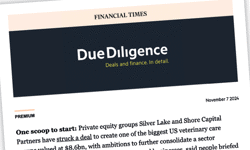
“Keep away from the people! Don’t go near the people!” – it’s the end of March 2020 and I’m finding myself bellowing this to my kids as we go out for our one state-mandated period of exercise. Catching the sound of my voice shouting these instructions, I’ve never felt more like I was living in a dystopian movie or a particularly bleak episode of Doctor Who. Which I guess I was. And looking around several months later, I feel I’ve been one of the luckier ones.
The impact of coronavirus has transformed the way I work daily, and is going to have a long-lasting impact both financially and behaviourally on the publishing industry. When it became apparent that some sort of lockdown was going to be enacted in the UK, at the Guardian it was decided to experiment with as many people working from home as possible for a couple of days, to see how we coped. A few of the print publishing systems still relied on people being on-site, but after those couple of test days, that has pretty much been the state of affairs for months now. A core team of senior editorial staff, supported by some specialist roles, in the office. And everyone else working from home. It’s quite the culture shock for a newsroom.
Most modern businesses have probably too many communication channels – email and WhatsApp and Twitter DMs and Slack and Gchat and so on. But it is incredible the extent to which publishing relies on non-verbal cues and body language. When an editor says “Yes” to your pitch, is it an enthusiastic lean forward “Yes”? Or a slightly reluctant, “I’m not sure this is going to pan out but I guess if you want to look into it…” kind of “Yes”? Or even an “I’m busy and saying yes will make you go away” kind of “Yes”? You can’t always get that from an email.
Across a news organisation, the disruption has been unevenly distributed.
Impact on journalists
Across a news organisation, the disruption has been unevenly distributed. For news, it was all hands on decks, you can’t write enough about this stuff. But what about the sport desk? Suddenly with no action, it was like all the slow closed season periods arrived all at once. There are only so many pieces you can write speculating about when events will resume. So, sports journalists found ways to channel their energies – best of lists, re-examining old classics, sometimes even inviting everybody to watch an old match at the same time and chat along with it. They’ve faced new challenges as sport gradually returns. The new Premier League kick-off time of 8:15pm, coupled with the introduction of ‘drinks breaks’ into each half, makes filing on-the-whistle reports in time for print deadlines a greater challenge than before.
The same has been true for arts and culture coverage – as the schedules gradually dried up of new programming, and with cinemas, gig venues and theatres closed, it became a case of reliving past glories. That, and it seems every single person on the planet has interviewed Tim Burgess and done a feature about the collective listening experience of his Tim’s Twitter Listening Parties.
And as for the business functions? What do you do with your ad sales team when nobody is buying advertising? Sadly, the answer in a lot of cases has been furloughing. But you can’t help wonder if those jobs are ever coming back.
Across the UK, there were swathes of editorial staff being furloughed or outright made redundant. For a while it looked like we might lose the world's oldest Jewish newspaper as the Chronicle was given a last-minute reprieve.
There was no such luck for BuzzFeed’s news operation in the UK. It had hired a great deal of journalistic talent over the last few years, and punched above its weight in terms of breaking political stories. But coronavirus hastened what might have been an inevitable shift, and it was shuttered. “Never work for an American company”, messaged one of my friends – he’d been there years and was being offered a paltry settlement.
It is incredible the extent to which publishing relies on non-verbal cues and body language.
Child minding
Nothing is cuter on TV news than somebody’s children interrupting them while they are doing a live interview. But stuck at home spending much of the day on video conference, there’s always a chance you are going to end up being the ‘BBC dad’ of your office. Robert Kelly handled the bold and sassy appearance of his daughter live on TV with aplomb. I did less well while shouting at one recalcitrant child up at the top of the stairs, and then in turn having my wife shout at both of us. My phone was constantly buzzing in my pocket. I pulled it out. Three separate colleagues were messaging me “MUTE YOUR MICROPHONE”, and my heart sank as I realised I’d just broadcast this scene of domestic bliss over the speakers in the office during the middle of morning news conference.
But, as I keep reflecting, I’m lucky. It has been tricky to balance my work, my wife’s work, and home-schooling the kids, but equally I’ve got a house full of people to keep me entertained, and a separate room I can use as an office. I worry about younger colleagues and people in more precarious living conditions – in an expensive flatshare and having to use your one room as your bedroom and your office. Everybody constantly eating up all of the wifi. It must be unbearable.
A few weeks into lockdown and I was relieved to read several articles about how “Zoom fatigue” is a real thing. That the energy required to pay attention in a video conference call is higher than that you need to put into face-to-face group meetings. There are some days that I’ve got four video calls back-to-back and it feels exhausting. There’s also the constant nagging feeling that things that could have been sorted out in a quick five minute huddle around someone’s desk stretch on for days because you can’t get everyone together at the same time. And, equally, a feeling that some things that previously might have been sorted out in a quick exchange of emails have morphed into video calls because…well…just because they can.
At times during the crisis, I’ve thought longingly about going into the office. But I know it won’t be anything like the environment that I remember. In fact, as time went on, the glimpses of Kings Place I got to see on video calls began to look ever less enticing, with more and more signs of enforced social distancing appearing every couple of days. The school where my children go has been having them in for “taster days”, where small groups of them go in one day a week to get accustomed to what a “socially distanced” school environment is going to be like, so it doesn’t come as a shock. It’s maybe an approach we’ll all have to adopt as adults. It feels like going back will just be going from one strange isolating experience straight into another strange and unusual experience.
It is so hard to get across the scale of the deaths in the country, which I fear will just be told as a big meaningless number.
Chronicling Covid
And then there is the impact on journalists of covering the story itself. What started off as a small news-in-brief on the foreign pages about a strange illness in Wuhan gradually loomed larger and larger until it seemed to encompass everything. It has driven record traffic to newspaper websites – perversely, of course, at a moment when there is less advertising to make that financially rewarding.
But there is the toll that telling the story takes on you. Some journalists are grieving for their own relatives. I didn’t get into journalism through a traditional route like going through training then on to a local paper then a national paper. Instead I arrived via writing, designing and working on the web for years. If I had a chip on my shoulder about never having done the necessary groundwork in dull court reporting and grim death knocks, I feel like I’ve done a lifetime’s worth in the last few weeks – even if they’ve been socially distanced.
It is so hard to get across the scale of the deaths in the country, which I fear will just be told as a big meaningless number. It’s incredible to think that the government decided to abandon daily press briefings at the point where the daily fatalities came down to only being between a Lockerbie disaster and a Piper Alpha disaster every single day. You see people on social media complaining that the death toll should be what is on the front pages relentlessly. I sympathise with them, but then everything we know about what makes people pick up a paper every day – any day – is that it has to have something new and a different angle to tell.
Making high-speed broadband for all a utility like electricity and water … now seems like a real priority for the nation.
What does the future hold?
There are big questions now for publishers going forward. Which of these changes are we going to make permanent?
Making high-speed broadband for all a utility like electricity and water was scoffed at when proposed in Jeremy Corbyn’s manifesto barely a few months back, but now seems like a real priority for the nation. In a country where remote working becomes more a part of the normal routine, the economic gulf between London and the rest of the country risks being exacerbated by the issue of broadband quality. It’s even noticeable in a London-based organisation that some members of the team who live in further-flung regions have more trouble with video conferencing. It’s a stark sign of the digital divide.
All of our national newspapers had endured years of declining sales and advertising revenue and cost-cutting anyway, exacerbated by the Covid-19 crisis. If you’ve got your eye on the costs spreadsheet, you must be eying up the line that says “Expenses of having an office” and thinking that there are huge savings to be made down the line – people have been successfully putting the papers out for months without most of the staff stepping inside them.
There’s a real risk in that though. It’s one thing taking an established newsroom team and suddenly distributing them back to their homes and laptops to work remotely. It is an entirely other thing to have that as an ongoing situation as staff grow and change. In a business that relies so much on relationships, how do you get yourself established if most of the people you are working with on a day-to-day basis have never met you in person?
And what about regional press? Local newspaper groups have been heavily criticised for centralising resources and offices into regional hubs, rather than having a newspaper office in every town. Surely that is a trend that can only accelerate when the number-crunchers look at the utilisation of office space during the Covid-19 crisis.
“Keep away from the people! Don’t go near the people!” – the memory of shouting that at my kids continues to haunt me. And every time I think of it, I also think of Frodo’s line in the Lord of the Rings, which has been oft-repeated on social media these last couple of months. “I wish it need not have happened in my time”. But it has. And we will be feeling the effects in our working practices and our publishing businesses for years to come.
How do you get yourself established if most of the people you are working with on a day-to-day basis have never met you in person?
This article was first published in InPublishing magazine. If you would like to be added to the free mailing list, please register here.












